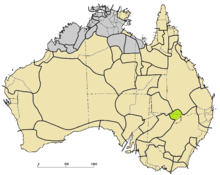Muruwari language
| Muruwari | |
|---|---|
| Region | Queensland and New South Wales, Australia |
| Extinct | 20th century |
|
Pama–Nyungan
| |
| Language codes | |
| ISO 639-3 |
zmu |
| Glottolog |
muru1266[1] |
| AIATSIS[2] |
D32 |
|
Muruwari (green) among other Pama–Nyungan languages (tan) | |
Muruwari (also Muruwarri, Murawari, Murawarri) is an Australian Aboriginal language, an isolate within the Pama–Nyungan family.
Muruwari means 'to fall (warri) with a fighting club (murru) in one's hand'.
The Muruwari people were an important group who occupied an area of Australia from about Cunnamulla in South West Queensland, southward to the northern bank of the Barwon River near Brewarrina, New South Wales. The Muruwari area included the towns and stations of Barringun, Enngonia, Weilmoringle, Milroy, Mundiwa, Warraweena, Goomballie, Fords Bridge, Yantabulla, and Warroo in New South Wales and; Caiwarro, Tinninburra, Weela, and Mulga Downs in Queensland.
The Muruwari language was collated from many tapes of language material recorded by Jimmy Barker of Brewarrina, Emily Horneville (Mrs Ornable) and Shillin Jackson of Goodooga, and Robin Campbell of Weilmoringle. The Murawari language was first published by R. H. Mathews in the early 1900s and again by Ian Sims, Judy Trefry, Janet Mathews, and Lynette F. Oates (1988).
The descendants of the Muruwari speakers mostly live in Sydney, Brisbane, Alice Springs, and small New South Wales and Queensland towns such as Brewarrina, Goodooga, Enngonia, Weilmoringle, Bourke, Cunnamulla, and Charleville.
Australian journalist and television presenter Allan Clarke is of Muruwari heritage.
Example sentence
- "Pitara yaan Muruwariki"
- Meaning: "Muruwari is good, sweet talk".
References
- ↑ Hammarström, Harald; Forkel, Robert; Haspelmath, Martin; Bank, Sebastian, eds. (2016). "Muruwari". Glottolog 2.7. Jena: Max Planck Institute for the Science of Human History.
- ↑ Muruwari at the Australian Indigenous Languages Database, Australian Institute of Aboriginal and Torres Strait Islander Studies
